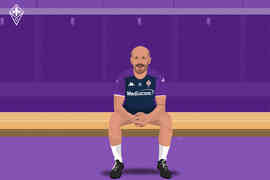
ONE ON ONE: VINCENZO ITALIANO
Perfection is the goal. Vincenzo Italiano is now at Fiorentina, and sat down with us to talk about his life, career and goals.
Never rest on your laurels. Perfection must be the goal.
After a 20-year playing career and four successful seasons as a coach, Vincenzo Italiano is now applying his football philosophy at Fiorentina – a philosophy he has developed over the years, starting with the sacrifices he had to make as a child...
BECOMING VINCENZO ITALIANO
"From when I was a young child, the only thing I ever wanted was to do was be a footballer.
“Even if you're from the south, where it is very difficult, if you're really passionate about football, you can achieve the impossible. And let me tell you, to get where I've come, starting from the small town in Sicily where I'm from, is something extraordinary. It's a small town called Ribera, near Agrigento. I'm only the third person ever from there to make it as a pro footballer.
“Passion helps you to make sacrifices. I moved away from home at 15 to study and live far away from my family, leaving my friends behind. Leaving everything that at that age you think you could never do without. Then I became a professional footballer. I had a great career, playing many seasons in Serie A and Serie B, and enjoyed lots of success too.
“Where I'm from, the difficulties are down to the facilities and organisation. There are fewer professional clubs – and opportunities – than in the north.
“You have to be totally dedicated to football; you have to really, really love the game. And of course you need the ability too – which only God can give you.
“Personally I was able to make the most of my ability. But I was also lucky to meet coaches who helped me and changed me along the way. As a kid, I played as a right winger – I used to love getting down to the byline and putting in crosses. Then one day a coach came in and had me play as a deep-lying playmaker. There and then I was put out by it because he'd moved me further away from the goal, and I liked scoring. But maybe that's what helped me make it because soon afterwards people started to sit up and take notice of me: I joined the academy of Trapani, in Serie C, then Verona in Serie A, making two steps up at once. And my career took off from there.
“I spent 11 years at Hellas Verona, then went to Chievo and Padova. I coached in Arzignano, then an amateur side in the province of Padua. I basically spent my entire career in Veneto – a Sicilian turned Venetian. My wife is from Verona and my children were born in Verona.
“Throughout my career I did feel the urge to go into coaching, partly because I was inspired by so many coaches along the way. I started off slowly and kept climbing, obtaining success in Serie D, C, B and A, one after the other. I was a clear, complete journey, and keeping Spezia in Serie A last season was the culmination of four fantastic years.
“Everyone had us down as relegation favourites last season. And what did we do? We did something extraordinary. But you can't rest on your laurels in this job. I'm not able to enjoy many things – I find it hard to sleep at night. Perhaps that's my secret to success; maybe that is what makes the difference – that and belief in yourself.
“Sometimes I see my coaching staff or my players are satisfied with something we've done but I tell them it's not ok – that we have to do better.
“I never rest on my laurels. I'm obsessed with football".
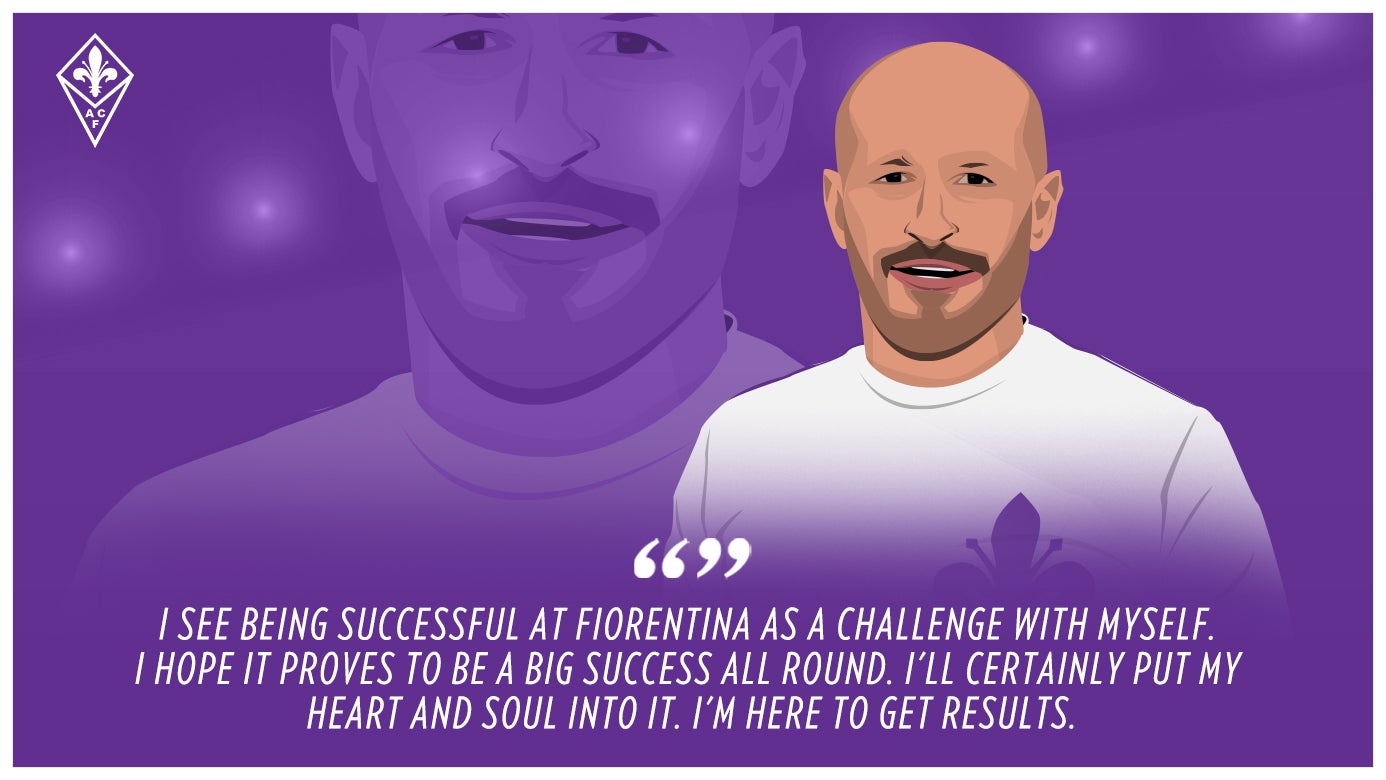
BEING A COACH
"I had four seasons in four different leagues with four different team. It's not easy switching to a different league every year. The level obviously goes up, the physicality increases and it becomes harder. It's difficult to get results. You have to start from scratch every time, with a new group and you have to drum your ideas in – your way of thinking and being.
“The hardest part for a coach is trying to convey your ideas and convince the players of your football philosophy. Once you've done that, it gets easier. But that's the aspect you have to spend the most time on.
“You must have a winning mentality and never take anything for granted, paying attention to every little detail. And even when you win, you must never become complacent because football is a sport that can knock you down in an instant. You have to keep striking the iron every day.
“As an ex-midfielder, I like to see team moves: I like to see everyone involved. I talk to the players about any problems that may arise during the year too.
“I think that has enabled me to obtain the excellent results I've had over the last four years".
AMBITION AND DESIRE TO WIN
"I'm still hungry for success and I've shown that by taking on this challenge at Fiorentina – the challenge of coaching a team that I faced as an opponent, a team with great quality and lots of top-level players. We have six internationals, three of whom won the Copa America, one the European Championship, Erick Pulgar with Chile and Christian Kouame with Ivory Coast. There's quality here and I hope to bring it to the fore.
“Working on the small details is crucial. Football is changing all the time and you learn something from every match – but you also have to come up with something new in every match. There are always new strategies, situations or ways of building play. Football moves at great pace so you need to be constantly on the lookout and never stop learning.
“I watch loads of matches and try to learn something from everyone. I'm then able to shape those ideas to fit other situations. I think that's the secret to staying at the top of the game.
“Innovation in football also depends on the players you're coaching. You move up and your ambition grows with the teams you coach. The quality of the players at your disposal can inspire you to alter principles or instructions you thought were set in stone. Your players enable you to diversify your ideas and be innovative in many ways.
“The more quality you have in the team, the better football you're able to produce. You can set out to play entertaining football but of course you need to strike the right balance because there are two sides to the game: attacking and defending. You should never be gung-ho.
“If you want to win, you need quality in everything you do".
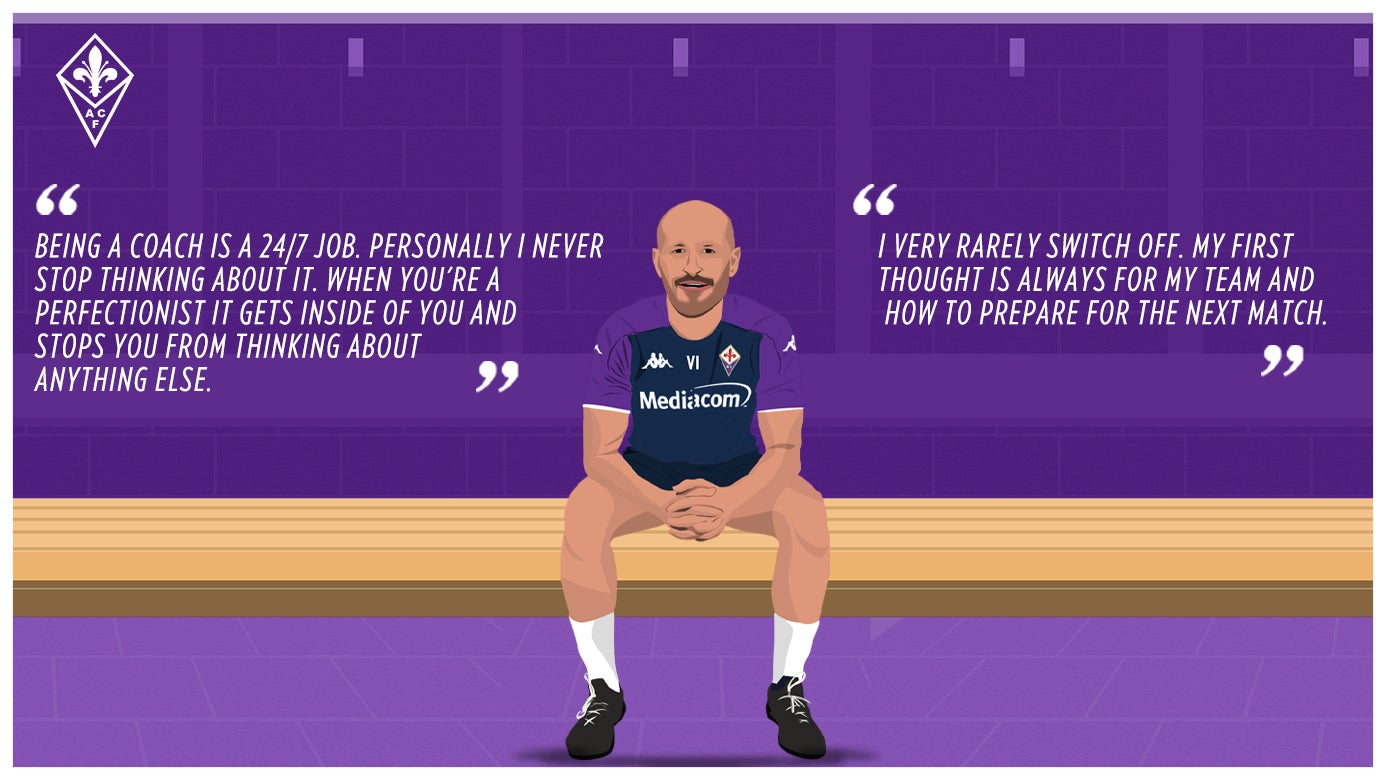
ROLE MODELS
"In recent times, you can't not mention [Josep] Guardiola, given everything he has achieved. [Maurizio] Sarri has earned a lot of plaudits too, both at Napoli and then Chelsea. [Jurgen] Klopp, Luis Enrique… Barcelona – they have their own football philosophy regardless of the coach. Barcelona always play the same way and that's something that appeals to me. It would be good to export it to other countries. [Zdenek] Zeman has always been an inspiration for many coaches, for the attacking football his teams played and the goals they scored.
“That's basically been my inspiration, considering that I play with three forwards and three midfielders.
“Those are the coaches who inspired me and I think anyone who wants to do this job can learn a lot from them".
DRESSING-ROOM MANAGEMENT
"You need to find the right mix of ingredients when you're the coach. You need to manage players, coach them on the field and sometimes be a psychologist too. You have to understand that in some ways you're the 'father' of all your players. You have to be there for them whenever they come knocking at your door looking for some advice.
“Clearly the stars have a more finely tuned cognitive ability and football intelligence. They're smarter tactically and see things before the others. That's what gets you to that level. It's not just technical ability, being good with your right or left foot, being able to dribble and shoot – intelligence is key too.
“The best players have superior brains".
DEALING WITH PRESSURE
"Pressure comes with being in the professional game; it's part and parcel of football. Playing without fans is not normal. We've adapted because we've had to go out there with no spectators, but having the stands full, with home and away fans, is part of what determines the results of games. They can put pressure on both the home side and the away team.
“A full stadium can drive you on and help you do the unexpected but it also puts pressure on your players. We can say it's not true but players hear the boos, just as they hear the applause.
“Footballers are human beings like the rest of us but I think where they stand out is in their ability to focus for 95 minutes when they step out onto the pitch and do what they have to do to win the match. Some players don't hear anything while others are affected by it. But if you want to be a footballer, you know you'll have to deal with pressure.
“You hear the boos, the applause and everything else but personally I never let it affect me, especially during the game: you just go out there and do what you have to do against the opposition.
“Once I said to my team that we were going to play against 23,000 spectators but those 23,000 spectators were outside the pitch: they're not on it with you. At the end of the day it's 11 v 11.
You just focus on the work you've done beforehand in preparing for that match and give it everything."
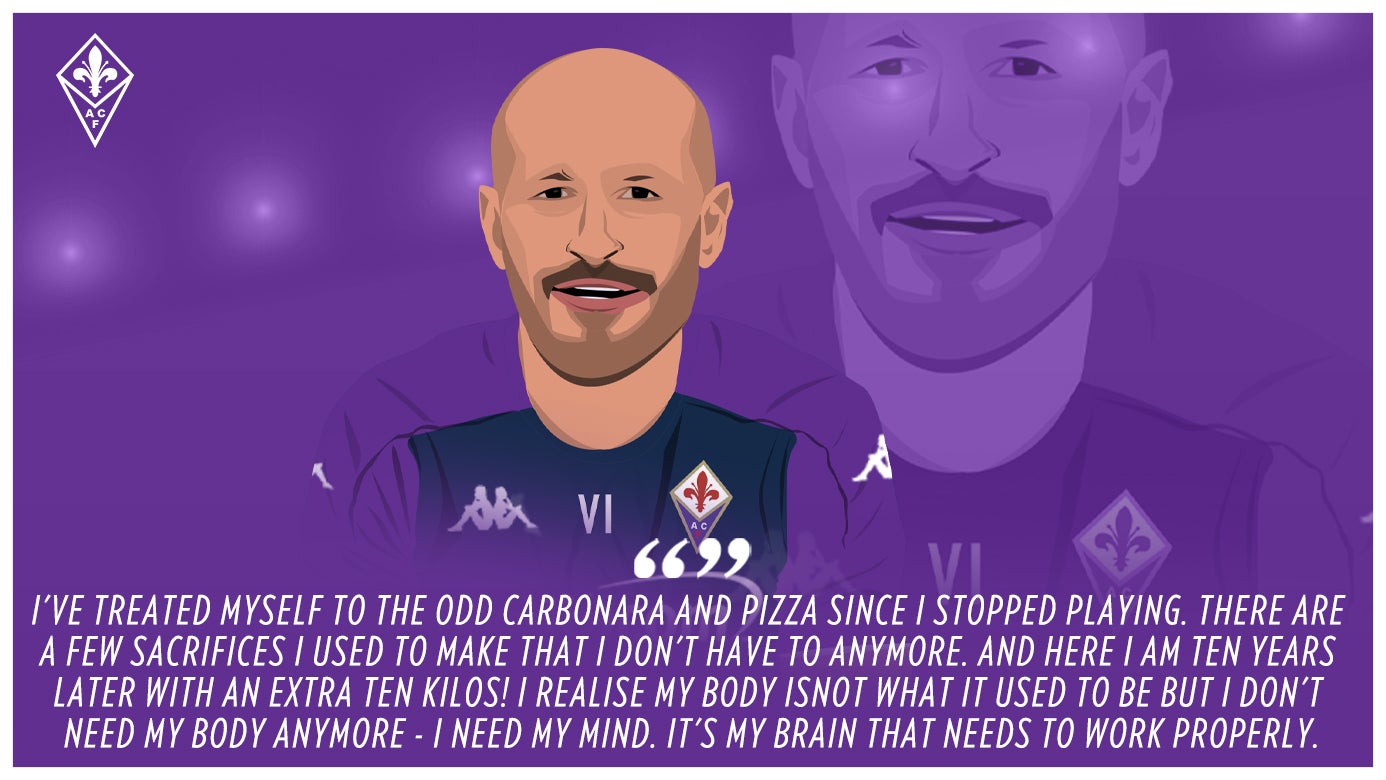
FREE TIME
"Being a coach is a 24/7 job – it really is.
“That's the difference between being a player and a coach. As a player, when training finishes, you can focus on your personal life and your free time. You can buy a book and read it, go for a walk, or take in a film at the cinema. You're able to switch off completely because at the end of the day it's the coach's job to do the thinking. You just play your part.
“Now that I'm on the other side of the fence and I'm the coach, I realise it's a lot more complicated. Personally I'm never able to stop thinking about preparing training sessions and solving things that aren't working. When you're a perfectionist it gets inside of you and stops you from thinking about anything else. I'm always thinking about what I want to do the next day in training or later in the week. I do read the odd book and occasionally go to the cinema, but it's rare.
“My first thought is always for my team and how to prepare for the next match."
MAKING SACRIFICES
"When you become a footballer you have to give up lots of things – there's no getting away from that. Food. Going out with friends. Smoking and drinking. You have to be nothing but your very best, especially physically.
“You have to be the right weight, eat well, drink well, rest, sleep, avoid evenings out. So many times friends asked me to go out with them – I must have turned down millions of invitations.
“Of course, since I hung up my boots, I've treated myself to the odd carbonara. I've had a few more pizzas. There are sacrifices I used to make that I don't have to anymore. And here I am ten years later with an extra ten kilos!
“Sometimes I play a training game or take a few shots at the end of the session, and I realise my body is not what it used to be.
“The thing is I don't need my body anymore – I need my mind. It's my brain that needs to work properly."
MOTIVATION
"You need to find the right motivation, the right balance, the right way to relax to unleash the tension.
“I've never needed anyone's help for that – I've always managed to do it by myself. I wanted to; I saw it as a challenge with myself, like a duel with an opponent.
“I managed to find the right balance on my own."
COMMUNICATION IN FOOTBALL
"There are lots of things in football that should remain between the four walls of the dressing room and be solved face to face. Certain situations should not be made public.
“A football team is made up of lots of different people and lots of situations. You get problems, moments of joy, difficulty and celebrations.
“In front of the cameras there are times when you try to keep certain things hidden and not show them to the public.
“There is a bit of secrecy because certain things simply should not be public knowledge."
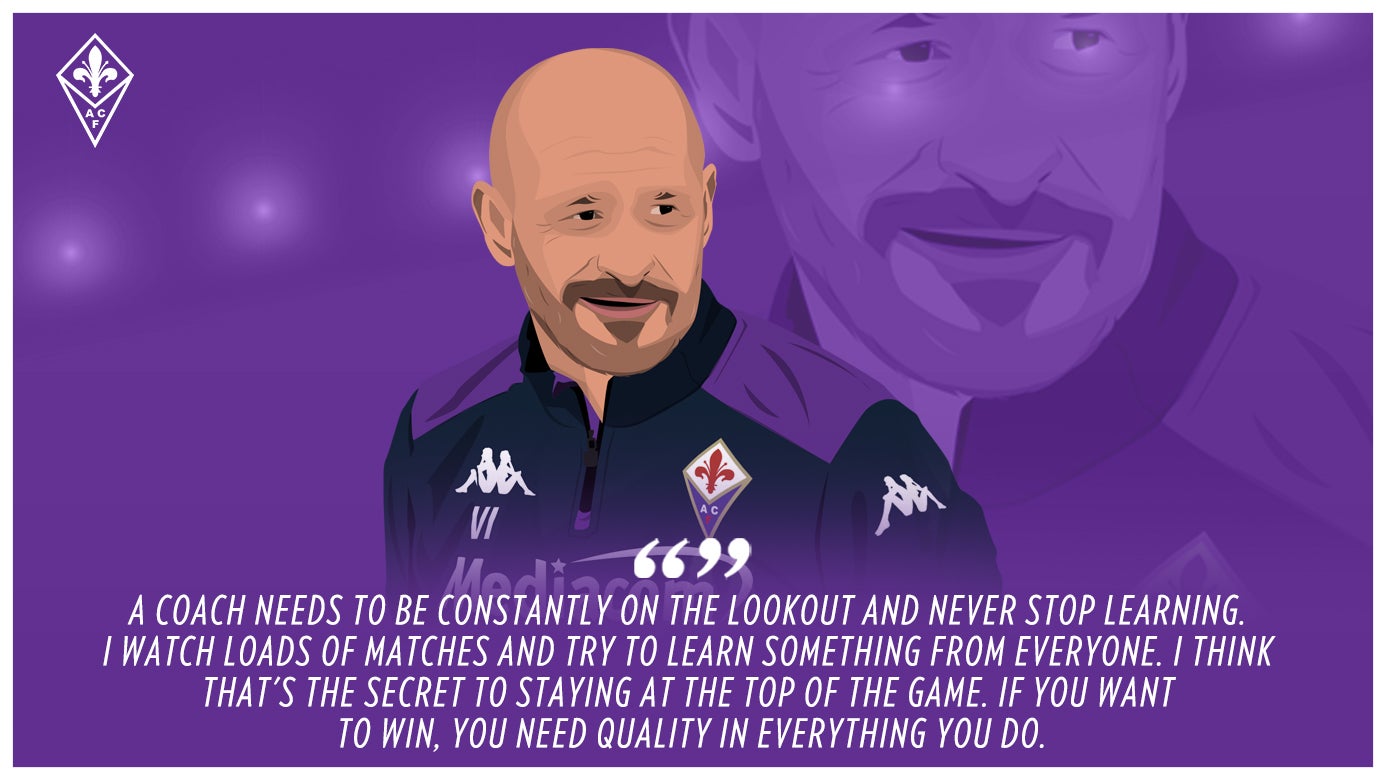
FIORENTINA
"I'm grateful to the club, to Rocco Commisso, Joe Barone and Daniele Prade. They really wanted me. That means everything to me. It means people value you, believe in you, have confidence in you. When that's the case, you're happy to take on the responsibility – to try to repay all of that.
“Slowly but surely, I'm getting to know everyone. This is a fantastic club, a top-level club. I took on this challenge because I believe this is a quality team, with lots of great players who perhaps haven't yet reached their full potential. That's the challenge for me. It's also a challenge with myself, to try to achieve something important.
“I hope it proves to be a big success all round: in improving the players, improving on last season, on a personal level and for Fiorentina. I'll certainly put everything I have into it – heart and soul – as I have at all the clubs I've worked for.
“I'm here to get results."
THE FANS
"It's the first time I've been given a reception like the one I got here. I was amazed by it, at my press unveiling too.
“I was amazed by what I saw in Moena as well: the stand was full every day, for every training session, with people watching and showing their passion.
“When I played in Florence with opposition teams, we knew we didn't stand much chance because of the prestige of the club and the quality of the players. I hope we can become like that team I used to be afraid of, which always showed how good they were. I want to create a strong identity, a close-knit team where it's one for all and all for one. That has to be paramount.
“We'll try to prove we're up to the task."
Intervista di Vieri Capretta (@VieriCapretta)







